Welcome to The Seawall’s semi-annual poetry feature. This season, thirteen poets write briefly on some of their favorite new and recent titles. This multi-poet/title feature is posted here in April and November. The commentary includes:
Mark Bibbins
on Slant Six by Erin Belieu (Copper Canyon Press)
Daisy Fried
on The Open Secret by Jennifer Moxley (Flood Editions)
Tarfia Faizullah
on Blood, Sparrows, and Sparrows by Eugenia Leigh (Four Way Books)
Dorothea Lasky
on The Feel Trio by Fred Moten (Letter Machine Editions)
Tony Hoagland
on A Wilderness of Monkeys by David Kirby (Hanging Loose Press)
Joshua Weiner
on Station Zed by Tom Sleigh (Graywolf Press)
Lisa Russ Spaar
on The Infinitesimals by Laura Kasischke (Copper Canyon Press)
David Roderick
on Darktown Follies by Amaud Jamaul Johnson (Tupelo Press)
Lee Upton
on Faithful and Virtuous Night by Louise Glück (Farrar, Straus & Giroux)
Fred Marchant
on 3 Sections by Vijay Seshadri (Graywolf Press)
Katie Ford
on The Accounts by Katie Peterson (University of Chicago Press)
Nick Sturm
on Soft Threat by Alexis Pope (Coconut Books)
Leslie Shinn
on Darkness Sticks to Everything by Tom Hennen (Copper Canyon Press)
* * * * * * * * * * * * * * * * * * * * * * * * * * * * * * * * * * * * * * * * * * * * * *
Mark Bibbins
Slant Six by Erin Belieu (Copper Canyon Press)
Americans, if you haven’t already, take note: Erin Belieu is possessed of a remarkable gift for sounding just like us, only smarter. She’s like the chef whose restaurant sits behind a modest storefront, with paper napkins and one fork per setting, but from whose kitchen emerge perfectly composed plates—intricate, sophisticated, and surprising. While she’s not likely to turn into the poetic equivalent of the chef in “When at a Certain Party in NYC,” who presents diners with a sushi roll “so confusingly beautiful that it makes itself / impossible to eat,” if she felt like it, given her intellectual and imaginative chops, she could. Readers of Belieu’s three previous collections know that her poems often assume a self-deprecating tone that winningly fails to conceal their complexity and depth:
Please. Don’t tell us
history. Nobody hearts a cemetery
like we do,
where re-enactors bite
their bullets between headstones,
and ancient belles in neck-high silk
prepare for the previously fought
war. Every day is a day before.
Even a short passage like this demonstrates Belieu’s range and technical skill, although, come to think of it, you’d be hard pressed to find a poem in Slant Six that doesn’t. I love the sly internal rhymes of “history/cemetery” and “war/before,” judiciously spread out so they can breathe; the slangy, self-aware substitution of “hearts” for “loves”; the rhetorical progression from tetchiness to artful description to that enigmatic, Stevensian last sentence.
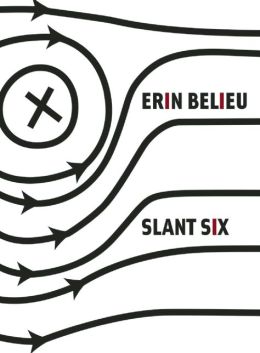 I have always admired the way Belieu enlists adjectives to do exactly what she needs them to do: in Slant Six lighthouses have a “butch neutrality,” dawn brings on a “keen pheromonal terror,” and the local mini-mart sells “Arthurian bongs.” She also knows her way around a simile: a rival is “cool as an aspic / served at a benefit luncheon with / a garnish I wouldn’t know not to eat,” and an ex-lover’s depression is “like a baby / in a black BabyBjorn […] the best sadness / anything warm could hope for.”
I have always admired the way Belieu enlists adjectives to do exactly what she needs them to do: in Slant Six lighthouses have a “butch neutrality,” dawn brings on a “keen pheromonal terror,” and the local mini-mart sells “Arthurian bongs.” She also knows her way around a simile: a rival is “cool as an aspic / served at a benefit luncheon with / a garnish I wouldn’t know not to eat,” and an ex-lover’s depression is “like a baby / in a black BabyBjorn […] the best sadness / anything warm could hope for.”
Belieu has lived in Tallahassee for over a decade, and the myriad quirks and kinks of the Sunshine State’s geographical, political, and social landscape seep into and animate — or aggravate — these poems. (I hope it’s not too facile to suggest that somewhere among them we might find the missing link between Sylvia Plath and Carl Hiaasen.) Florida turns out to be a good home base for such an adept observer of the corporeal and the carnal, the abject and the absurd; she spots “flies ass-up in the Jell-O, / the soft bulge of thunderheads,” and memorably declares, “I’m circling / the swampy taint of this Southern city.” Elsewhere she notes that “the body lets the spirit down,” although it seems pretty clear that it’s a two-way street.
Each of Belieu’s previous books has contained at least one longer poem, usually broken into sections — I’m thinking of “from The Exploding Madonna” in Infanta, “High Lonesome” in One Above & One Below, and “In the Red Dress I Wear to Your Funeral” in Black Box. The longest poems in Slant Six swap fragmentation for a more sustained kind of contemplation — although that’s really too serene a word for the relentless, scathing, hilarious, and syntactically exhilarating trips that they are. “Time Machine” begins with a Volvo cutting Belieu off in traffic, thus sparking a dizzying exposition on class and the mutability of experience and memory. It also happens to contain one of the most devastating instances of enjambment I’ve seen in a long time:
In the rearview I look pretty
unpromising, a state-school scrub,
the missing link of thrift-store chic.
 If any of us were ever instructed not to reveal that we have personalities in poems, I’m grateful every time I read one of Belieu’s that she ignored that memo. But no matter how deep her investment in her subjects, even when the subject is herself, she is able to stand just to the side of them, so we can see them clearly. This is true of Slant Six’s other long piece, the show-stopping and deeply personal “Poem of Philosophical and Parental Conundrums Written in an Election Year.” It kicks off with her seven-year-old son announcing, from the backseat, his distaste for Republicans — while I don’t envy the amount of time this poet seems to spend stuck behind the wheel, I do envy the poems it incites — and it doesn’t let up for six pages. Just read it — paraphrase won’t do, and I’m already over my word limit.
If any of us were ever instructed not to reveal that we have personalities in poems, I’m grateful every time I read one of Belieu’s that she ignored that memo. But no matter how deep her investment in her subjects, even when the subject is herself, she is able to stand just to the side of them, so we can see them clearly. This is true of Slant Six’s other long piece, the show-stopping and deeply personal “Poem of Philosophical and Parental Conundrums Written in an Election Year.” It kicks off with her seven-year-old son announcing, from the backseat, his distaste for Republicans — while I don’t envy the amount of time this poet seems to spend stuck behind the wheel, I do envy the poems it incites — and it doesn’t let up for six pages. Just read it — paraphrase won’t do, and I’m already over my word limit.
When Belieu combines withering sangfroid with deep empathy, as she does brilliantly throughout Slant Six, especially in poems like “Love Is Not an Emergency” and “The Body Is a Big Sagacity,” it might seem like she’s trying to have it both ways. But to me this looks more like a strength than a liability. (To a fellow Libra, I guess it would.) After all, why shouldn’t we revel in our complicated, even contradictory, perceptions of our screwed-up world and the ways we try to survive it? Why shouldn’t our disgruntlement be leavened now and then by beauty and joy?
[Published November 4, 2014. 68 pages, $16.00 paperback]
Mark Bibbins is the author of three collections of poems, most recently They Don’t Kill You Because They’re Hungry, They Kill You Because They’re Full (Copper Canyon Press). He lives in New York City, where he teaches in the graduate writing programs of The New School and Columbia University.
* * * * * * * * * * * * * * * * * * * * * * * * * * * * * * * * * * * * * * * * * * * *
Daisy Fried
The Open Secret by Jennifer Moxley (Flood Editions)
This is — shameful admission — the first book of Jennifer Moxley’s that I’ve read. Such is the surefooted intelligence of The Open Secret that now I expect I’ll read lots more of her. I start with this admission because I’ve read that Moxley changes with every book, and yet there’s something extremely trustworthy in the dry directness and grace of address, as if absolutely not to have designs on the reader is one of Moxley’s primary goals. This makes me think whatever she is doing elsewhere, however different from this, it will be honest and rigorous.
 Traditional lyric pleasures of image and metaphor mostly aren’t her thing in The Open Secret — except when they are, as in the opening lines of the first poem in the book, “There is Birdsong at the Root of Poetry,” in which Moxley writes of “feathers planted/below fragile branches/of avian feet but introduces that image by calling it “untenable” and suggesting we are “Hemmed in by” it. Like many other poems in the book the poem is an act of perception and an interrogation of perception, an act of ethics and an interrogation of ethics.
Traditional lyric pleasures of image and metaphor mostly aren’t her thing in The Open Secret — except when they are, as in the opening lines of the first poem in the book, “There is Birdsong at the Root of Poetry,” in which Moxley writes of “feathers planted/below fragile branches/of avian feet but introduces that image by calling it “untenable” and suggesting we are “Hemmed in by” it. Like many other poems in the book the poem is an act of perception and an interrogation of perception, an act of ethics and an interrogation of ethics.
Moxley hasn’t the flamboyant personality of a New York School type, but reading The Open Secret, I kept thinking of Frank O’Hara’s mock (but not entirely mock) manifesto, “Personism”: “I don’t believe in god, so I don’t have to make elaborately sounded structures” and “The poem is at last between two persons instead of two pages.” Many of Moxley’s poems here are so direct as to feel like someone is talking in the same room as you, but without any sense of someone performing at you, except insofar as the performance is embedded in the poet’s temperament rather than something the poet puts on to hide behind or manipulate.
“Coastal,” dedicated and perhaps talking to a friend, is one of several long poems of statement, digression and accretion, which are my favorites of the book. It begins
Your lover claimed that in Los Angeles nothing felt changed.
And now? As California melts down with wildfires
and fiscal crises I feel irritated at its dominance.
Hogging the airwaves and votes. “It’s like a war out there,”
you wrote, speaking not of the budget shortfall
but of being an “old” artist in a young business.”
You couldn’t go straight from that irritation to a reference to 9/11, without trivializing, well, everything. At this point, Moxley drops in the kind of half comic and really quite apt metaphor you’re more likely to find in fiction than in poetry with its cultivated elegances:
Today the sky is the color
of Henry Fonda’s eyes, bright, crisp, and principled.
As if no time had passed, or as if the same September sky
from eight years ago this day decided to reappear.
 See, you couldn’t make that transition with a metaphor that went for pathos or for ethereal decoratoin, unless you wanted to add your poem to the mass of dreadful 9/11 poems. Rather, you need something intrusive and abrupt and dissonant, like Fonda’s eyes, and you need to go far into the metaphor till you’re not sure which is tenor and which vehicle: sky or Fonda, Fonda or sky. You need to get that far away from where you’re aiming, so that the Big 21st Century Subject So Far is approached with enough distance, perception and taste treat it authentically, to avoid falsifying either the emotion or the politics surrounding it.
See, you couldn’t make that transition with a metaphor that went for pathos or for ethereal decoratoin, unless you wanted to add your poem to the mass of dreadful 9/11 poems. Rather, you need something intrusive and abrupt and dissonant, like Fonda’s eyes, and you need to go far into the metaphor till you’re not sure which is tenor and which vehicle: sky or Fonda, Fonda or sky. You need to get that far away from where you’re aiming, so that the Big 21st Century Subject So Far is approached with enough distance, perception and taste treat it authentically, to avoid falsifying either the emotion or the politics surrounding it.
“Coastal” is a poem that touches on a lot of things — memories of a party at which a skateboard ramp was set up in an artist studio, the difference between east and west coast landscapes, lots of politics and economics, memories of a Vietnam vet raging on 9/11, “thrilling with the fear that he might be called/back to active duty. I hadn’t seen such fierceness in him/since his can of strawberry Slim Fast/went missing from the communal fridge.” And lots and lots about what poetry is for and what it can and can’t do:
Is privilege, therefore, the surreptitious mission
and final end of human rights?
“The poem should not ask such questions,”
chirps the goldfinch from the window. Plumage is all.
That feels simultaneously jokey and serious. And:
How would you like the politics in your poetry?
How about in your painting? Romantic and sad
or smart and structural?
and
In school I was told that poems only matter
if rooted in the landscape. A baffling decree for an abstract
art. At least you could sculpt, if you really had to.
I wrote about a sidewalk with a false sense of history.
A Seven-Eleven and a chain link fence.
and
The local wants to distract you
into forgetting that there is a world. “I won’t,”
I say, “I won’t,” stamping my feet in place.
and, for once narrating the self in real time, if minimal (Moxley isn’t one for much dramatization):
Feeling panicky about going on so long I show
this to Steve in draft form. “So this is your 9/11 poem?”
Echoes of an oft-quoted line from Reds:
”With all that’s going on in the world”…. Why now.
Some of this seems mostly witty, like a smart woman doing creative nonfiction without a lot of lyric boondoggle, in more or less blank verse lines. And yet the whole thing — this poem and this book — ultimately operates somewhere in the realm of lyric: a performance of feeling and intellect so good it manages to seem nothing at all like a performance.
[Published October 1, 2014. 96 pages, $15.95 paperback.
Daisy Fried’s most recent book of poems is Women’s Poetry: Poems and Advice (University of Pittsburgh Press, 2013)
* * * * * * * * * * * * * * * * * * * * * * * * * * * * * * * * * * * * * * * * * * * *
Tarfia Faizullah
Blood, Sparrows and Sparrows by Eugenia Leigh (Four Way Books)
I have a lot of questions about faith. I’ve spent a lot of my life feeling pretty safe in my position of intense skepticism punctuated by moments of awe and belief. Lately, though, I want to give in to the exuberance of wonder without fear, which extends, oddly, to looking at the wounding and trauma in our lives with wonder as well.
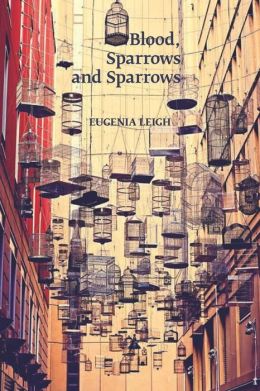 I thought a lot about my own wrestling with faith as I read Eugenia Leigh’s deeply felt and exquisitely wrought debut Blood, Sparrows and Sparrows. I remembered the Sufi prayer, “Lord, increase my bewilderment.” These poems are not afraid of pissing off God. They do not deny abuse, troubled familial relationships, or self-laceration. But they are willing to look God in the face and say, “I don’t get it, but I love you anyway and I’m down for the ride.” As Leigh has said in an interview, “How anyone could mistake this piece of art for a scientific account baffles me. It sound to me like this story was written to help us rewrite how we perceive ourselves and the world around us.”
I thought a lot about my own wrestling with faith as I read Eugenia Leigh’s deeply felt and exquisitely wrought debut Blood, Sparrows and Sparrows. I remembered the Sufi prayer, “Lord, increase my bewilderment.” These poems are not afraid of pissing off God. They do not deny abuse, troubled familial relationships, or self-laceration. But they are willing to look God in the face and say, “I don’t get it, but I love you anyway and I’m down for the ride.” As Leigh has said in an interview, “How anyone could mistake this piece of art for a scientific account baffles me. It sound to me like this story was written to help us rewrite how we perceive ourselves and the world around us.”
This view of the world as a piece of art is the center of gravity around which so many poems bend their questions. In “Pretty Universe,” for example, God is both an artist and a spoiled child:
Sometimes, God wants
to be understood. Sometimes, God hates
his perfect grammar. His pretty
universe. So he’ll pluck a butterfly of its left wing. Call it
art. He’ll turn from a hurricane. Say, “It wasn’t me.”
I’m struck by the shapeliness of these lines, how line breaks are hinges that connect “perfect grammar” to “pretty universe” so subtly that we aren’t aware of the powerful associations Leigh asks our brains to make. The fragments in these lines work in tandem with the statements to assert an undeniable and wrenching syntax.
What also impresses me most about this book is also how it wrestles with the trauma of familial abuse with faith in mind. A poem such as “Wire Hangers,” for example, renders the way abuse is often inherited and generational, but it does so as a series of pleas that add up to a prayer in lines that swerve and spill:
Will you hold the small boy version
of my father and hide him
in the trash can? Will you hold his father
back and put his knife
down? And when you put my grandfather’s knife
down, will you pull my father’s knife
from my pregnant mother’s chest? Will you hold her
until she sings again? Will you hold
their third miracle
daughter when she is born with her infant roar,
both knees? And when you hold me, will you hold
only the lies I told our pastor
or will you hold the police report that tells
I hit the bathtub when he knocked me out?
Leigh is not interested in indicting anyone for abuses suffered. Rather, she is willing to excavate for us the ache that comes from the clarity of seeing the way violence begets violence. This clarity, the music of these gliding lines, permits us to be empathetic of those we would rather dismiss as monsters. Leigh is masterful in taking such intense subject matter and moving its rendering from self-pity into self-awareness, and therefore, it seems, into self-forgiveness.
 Reading Blood, Sparrows and Sparrows reminded me of George Herbert’s assertion that “He who cannot forgive breaks the bridge over which he himself of pass.” Leigh’s poems nakedly envision a world of complicated hope, and in doing so, create a foundation for that bridge of ourselves over which we pass to remain intact, at least for a little longer. Leigh asks that we all participate in its remaking if we are willing to do the breaking. “But what if an artist’s job is also to challenge what we see and know by imagining possibilities beyond our present realities?” she has asked. How do we do such a seemingly impossible thing? An answer, throughout this arresting collection, and in these last few lines of the last poem of the book, “Happy Couple”:
Reading Blood, Sparrows and Sparrows reminded me of George Herbert’s assertion that “He who cannot forgive breaks the bridge over which he himself of pass.” Leigh’s poems nakedly envision a world of complicated hope, and in doing so, create a foundation for that bridge of ourselves over which we pass to remain intact, at least for a little longer. Leigh asks that we all participate in its remaking if we are willing to do the breaking. “But what if an artist’s job is also to challenge what we see and know by imagining possibilities beyond our present realities?” she has asked. How do we do such a seemingly impossible thing? An answer, throughout this arresting collection, and in these last few lines of the last poem of the book, “Happy Couple”:
This is how you
learn your part. We harmonize. You scrape the sky
with that free arm. I shift my eyes
away. How I learn to cry. A hammer sits
quietly in my bag. Next to the last nail.
For now, we sing.
[Published Octover 7, 2014. 84 pages, $15.95 paperback]
Tarfia Faizullah is the author of Seam (SIU 2014). She is the Nicholas Delbanco Visiting Professor in Poetry at University of Michigan’s Helen Zell Writers’ Program and co-directs the Organic Weapon Arts Chapbook Press and Video series with Jamaal May.
* * * * * * * * * * * * * * * * * * * * * * * * * * * * * * * * * * * * * * * * * * * *
Dorothea Lasky
The Feel Trio by Fred Moten (Letter Machine Editions)
I’ve been a big fan of Fred Moten since I heard him read from B Jenkins at the Segue Readings series several years ago and I was so excited to read his new book, The Feel Trio, out this year from Letter Machine Editions. The book takes its title from an album by Cecil Taylor, William Parker, and Tony Oxley. The name resonates with the group’s trio of three members, along with the 3-part structure of the recording. It is a performance of free jazz and on the album, a listener is not only party to the product of creation, but the process of it, so that the layers of feelings which make and refine the music are all on display for everyone.
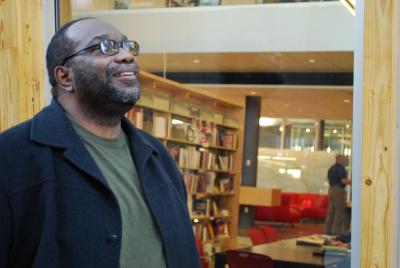 In contemporary poetry, there is often a convention to create a book with section breaks (or to rebel against this convention entirely with no sections or some sort of halfway point of the deviance of the practice). Like uniform stanza lengths, section breaks can indicate to the reader that the poet is in control of the structure of the entire piece and that language is fully under his or her control. Reading Moten, we know that controlling language is not his aim, and instead it seems to be his goal to let language control both the poet and the reader, and also the world. And like the Taylor album, this book has three sections, but acts as a trio, and functions like a painted triptych, with all three parts functioning as a whole and yet vibrating separately and of their own accord. In this manner, The Feel Trio is a triptych book and gives new license for how we might structure books in the future to resist conventional structure and organization just for convention’s sake.
In contemporary poetry, there is often a convention to create a book with section breaks (or to rebel against this convention entirely with no sections or some sort of halfway point of the deviance of the practice). Like uniform stanza lengths, section breaks can indicate to the reader that the poet is in control of the structure of the entire piece and that language is fully under his or her control. Reading Moten, we know that controlling language is not his aim, and instead it seems to be his goal to let language control both the poet and the reader, and also the world. And like the Taylor album, this book has three sections, but acts as a trio, and functions like a painted triptych, with all three parts functioning as a whole and yet vibrating separately and of their own accord. In this manner, The Feel Trio is a triptych book and gives new license for how we might structure books in the future to resist conventional structure and organization just for convention’s sake.
One of the great hallmarks of Moten’s book is that it takes music and begins a conversation with it. It pushes the edges of what poems must be — either on the page or at a reading—and suggests poems are inherently transdisciplinary and go backwards and forwards through other art forms to make new meaning. For many poems, music is the trigger to the sound of them, but the sound of The Feel Trio’s poems are collaborating with Taylor’s record and music elsewhere on several levels that go beyond a one arrowed direction. They are not even concerning an arrow; they are the multi-leveled umbilical chord that connects the speaking to the living again and again through poetry. They say a poem must not be what we thought it was, it must be and only be everything that is yet to be.
I like to listen to Moten read and speak about his poems. On a recording on Penn Sound, Moten says somewhere in a Q&A about “I ran from it and was still in it”, that “Jazz is not … the end of ideology, it’s the beginning of ideology, if you ask me.” This is exactly what I love about Moten’s work. It delights the mystical and kinks it so that a poem can never be exactly what you might say it’s “about.” It can only be what it is, part recording of the making itself and part what transcends that making into the glorious, past the boundary of the thing.
Part of what Moten discusses too on this recording is the making of several poems in this section of the book, and specifically at one moment he mentions how he created this poem:
I turn forty-four like leory kelley but dug in. the fat
middle is like twenty-two in the afterlease. up in the
joint of protesting joints and unreliable joints and too
old to smoke but every once in a while I be smokin’
but small and unsustained like marvis frazier. you want
your kids to be better than you but still love you when
the prophets are meant to you. slide away in the crowd
having felled no trees as dennis edwards in the burning
earliness. you no other flower in the world. you like a
rose but lost to the world. black art is late work. Before
every other thing but off to the side in the thing of it is.
The poem’s creation and its components share mystical elements in their connections. Aside from discussing how the poem references his son Lorenzo (“you want your kids to be better than you”), as his son has a complicated relationship to language, and the singer, Dennis Edwards, he also mentions in the recording that he wrote the poem as he was turning 44, so there are all of the sweeps of this reality and its boundary between adulthood and old age, the being “too/old to smoke but every once in a while I be smokin’,” but also that Leroy Kelley is a running back and played as number 44.
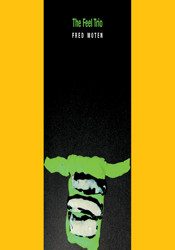 As a reader, I couldn’t help but think too of the Notorious B.I.G. line, “Kick in the door, wavin’ the forty-four,” from his song “Get Money,” a song that arose out of Junior M.A.F.I.A. collaborations with many artists who were his childhood friends and highlights the height of his collaboration with the great Lil’ Kim. The 44 in that song is of course a gun and the song is all about the violence of power and language and the moment when someone demands respect (even when it may or may not be warranted or earned). And reading Moten’s poem, I can’t help but connect the two — the speaker of the poem who turns 44 and what this age, the approaching middle age, means to the poet, who must now kick in the door and not run from the inevitable death, but instead run into it.
As a reader, I couldn’t help but think too of the Notorious B.I.G. line, “Kick in the door, wavin’ the forty-four,” from his song “Get Money,” a song that arose out of Junior M.A.F.I.A. collaborations with many artists who were his childhood friends and highlights the height of his collaboration with the great Lil’ Kim. The 44 in that song is of course a gun and the song is all about the violence of power and language and the moment when someone demands respect (even when it may or may not be warranted or earned). And reading Moten’s poem, I can’t help but connect the two — the speaker of the poem who turns 44 and what this age, the approaching middle age, means to the poet, who must now kick in the door and not run from the inevitable death, but instead run into it.
Perhaps another large reason I feel connected to Moten’s work and this book is that it does depend on the importance of feelings. It says that feelings can be the thing itself ––they need not be the undercurrent to rational construction and total adherence or rebellion from the past. His poems say pathos is important. And that’s important. As the title mentions in its reference, this book is The Feel Trio, it is a set of lived feelings, bad or good, that the speaker of the poems doesn’t run away from.
Again, in the Penn Sound recording, he discusses how part of his constraints for “I ran from it and was still in it” was to “Start them all with I as a sort of perverse revival of the supposedly dead lyric I.” Even in the other sections of the book that do not begin with this constraint, Moten sets upon to make the frame of feeling for each poem. As he instructs us, in these poems, “feel the liturgical east,” but “sometimes it gets deep in the hold” so “I vocoded baby, I blew holes in fading, I grew cultures in the subterfuge,” because “just about to pay/ just about to be okay/ just about to run run runaway,” and finally, that “the city of god is too much more than whole, come on and dance and eat and rub.” It is — this city of god. It is too much more than whole, so much more. So, “come on and get it!” Moten says — let’s get to, living.
[Published April 15, 2014. 104 pages, $20.00 paperback]
Dorothea Lasky’s fourth book of poems, Rome, has just been published by W.W.Norton/Liveright. She lives in New York City and teaches in the writing program at Columbia University’s School of the Arts.
* * * * * * * * * * * * * * * * * * * * * * * * * * * * * * * * * * * * * * * * * * * *
Tony Hoagland
A Wilderness of Monkeys by David Kirby (Hanging Loose Press)
In David Kirby’s earliest books, Saving the Young Men of Vienna (1987), and Sarah Bernhardt’s Legs (1983), you can find a poet aesthetically from the same hometown as the young Billy Collins: antic, adroit at the metaphor that swells like a bubblegum-balloon from the mouth of the speaker — undeniably funny, but also too much in the thrall of a sweet tooth, the cotton candy flavor of pop culture.
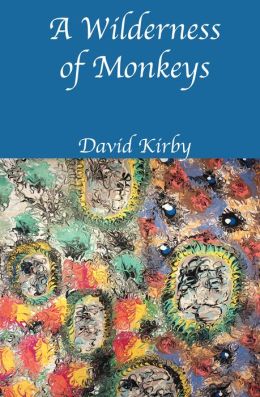 What Kirby became, surprisingly, was a much ampler and more rangy raconteur poet, one who mostly forgoes the instant-gratification of metaphor-candy for the larger, more worldly and wiser contemplations of the discursive poem. Kirby’s poems are intimately conversational, yet also formal, if that makes sense, in a drinks-before-dinner kind of way. He is a Mark Twain-style sort of speaker who ambles into a story, takes it through many different turns and permutations, and ends up guiding you, remarkably enough, to an contemplative scenic overlook on the human condition.
What Kirby became, surprisingly, was a much ampler and more rangy raconteur poet, one who mostly forgoes the instant-gratification of metaphor-candy for the larger, more worldly and wiser contemplations of the discursive poem. Kirby’s poems are intimately conversational, yet also formal, if that makes sense, in a drinks-before-dinner kind of way. He is a Mark Twain-style sort of speaker who ambles into a story, takes it through many different turns and permutations, and ends up guiding you, remarkably enough, to an contemplative scenic overlook on the human condition.
Kirby is very good at this civilized mode of poetic discourse — in his own way, he is in a league with C.K. Williams, Stephen Dunn, B.H. Fairchild, Denise Duhamel, Albert Goldbarth, et. al. — the contemporary discursive masters. In an essay and an anthology by the same title, Kirby has labeled this poetic mode the UltraTalk School of Poetry, a genre in which the poet puts everything he knows into the poem at hand. Kirby has the syntactic and the associative means to do it, and his relaxed, erudite, pleasure- yet also meaning-seeking temperament constitutes a distinct and worthy peninsula of American poetry.
Being a humorist, a “comic poet,” Kirby is doomed to be forever underestimated; comic poets are inevitably underrated, as if making a reader laugh is easier than making him weep, or gasp, or think (though these are not mutually exclusive responses). In poetry, comedy is the equivalent of the one-night stand — sure, many people like it, but they don’t respect themselves in the morning. “Oh yeah,” they say, “I like funny poems–they relax me and get me ready for the serious stuff, the real poets –like Rilke, or Charles Wright, for instance.”
Even so, if people really knew, Kirby has written some astonishing poems over the years, though they are somewhat concealed in the big bouquet of more obviously comic poems. Seek out and read “The House of Blue Light,” for example, or “The Story of Lurch,” to name just two from the oeuvre. You’ll stand amazed.
 I had already known this, but I was reading one of my many Kirby books six months ago, and laughing at his intelligent, riffing meditations on humanity when it dawned on me how consistently expansive, omniscient and compassionate his work is. “By gad,” I said to myself, “David Kirby is a spiritual poet!” Not only that, he’s a transcendent humanist who should be on the same shelf with Mary Oliver and Jane Hirschfield, poets who intend to loosen the muscles of the heart and cause you to look more kindly at the human world and yourself. All those years, while he was doing stand up in the Tiki Room of American poetry; Kirby was developing into a considerable poet of the large heart and a surprising spirituality.
I had already known this, but I was reading one of my many Kirby books six months ago, and laughing at his intelligent, riffing meditations on humanity when it dawned on me how consistently expansive, omniscient and compassionate his work is. “By gad,” I said to myself, “David Kirby is a spiritual poet!” Not only that, he’s a transcendent humanist who should be on the same shelf with Mary Oliver and Jane Hirschfield, poets who intend to loosen the muscles of the heart and cause you to look more kindly at the human world and yourself. All those years, while he was doing stand up in the Tiki Room of American poetry; Kirby was developing into a considerable poet of the large heart and a surprising spirituality.
Why haven’t you known this? In part, perhaps because Kirby ‘s poems are of an awkward length — longish, two or three pages — which makes them hard to quote or read to friends; also, he’s a little ribald, and definitely too much fun for the academy. Here’s the opening of a poem from his new book, A Wilderness of Monkeys, the poem titled “I’m Kind of a Whore, But She’s Like, Way a Whore (overheard in front of the building where I teach)”:
This is the kind of thing that makes me happy.
Not that young women are whores,
but that the world is so generous with its gifts: coffee, for example,
and newspapers. New clothes , to be sure,
but old ones as well: stretchy sweaters, jeans with
holes where the knees should be, caps with ragged
brims. The world gives us alcohol, sunshine,
music, and if we’re lucky, all three together…
The poem turns into a lively digression-laden catalogue of things to be grateful for, likeable enough in itself, but it ends like this:
… Everywhere the world is broken,
and only the poets can make it one again. I bet those two
young women are doctors. No, wait — mathematicians.
In another poem, a meditation on the old American folk ballad, “John Henry,” the speaker admits to being grateful for the miraculous train system whose invention killed the steel-driving man, John Henry, but then offers an aside:
Are you not
John Henry, reader, and Polly Ann as well? And are
you not the Captain and the hammer itself
and the little piece of steel? And aren’t you also
the steam drill the machine that killed everybody, blew
them up against the parlor’s wall like so many fading
lithographs? …
These kinds of cosmic effusions occur with startling frequency in Kirby’s poems, and they are genuinely sincere, which is not surprising, considering that some of the poet’s literary heroes are Melville and Whitman.
In this new book, Kirby increasingly uses a method of pastiche-discourse, that is, he pursues his themes, meanwhile furnishing its nooks and crannies with quotations from a broad array of sources. The effect is a rich, wildly variegated texture of dictions and aphoristic finger foods, which nonetheless holds together. Here are the concluding lines of “Infinite Cornucopia”:
In his most mature essays, Montaigne wrote of
the old Romans Petronius and Tigillinus, who, in Sarah
Bakewell’s words, “died surrounded by jokes, music,
and every day conversation, so that death simply flowed
onto them amid the general good cheer.” Ha, ha! Younger
thinkers turn parties into death scenes, older ones turn
death scenes into parties! Why should I die just because
everyone else does? Sam Cooke says don’t know much
about history, don’t know much about the French I took,
but I do know that I love you, Let’s have a party!
Cokes are in the icebox, popcorn’s on the table.
What a wonderful world this could be.”
Montaigne seems the perfect sponsoring literary angel for this poet and this book, whose method and spirit resemble that of the French master– never stop thinking, always be interesting, never stop being human. There’s something perennial, permanent and transcendent in values like that.
[Published January 15, 2014. 104 pages, $18.00 paperback]
Twenty Poems That Could Save America and other essays by Tony Hoagland has just been published by Graywolf Press.
* * * * * * * * * * * * * * * * * * * * * * * * * * * * * * * * * * * * * * * * * * * *
Joshua Weiner
Station Zed by Tom Sleigh (Graywolf Press)
Since the publication of his first book, After One (1983), Tom Sleigh has established himself as one of the preeminent poets of any generation now scribbling, and at a time when the possibilities of how a poem might be defined have grown increasingly open, indeterminate, and unstable (not to mention mutable and even questionable). The best of times, the worst of times for poetry? Like terror itself, American poetry has oscillated recently between states of utter boredom and great excitement. The ethical uncertainty and physical brutality of our political situation at home and abroad has also infected Sleigh’s poetry like a virus whose raging fevers induce by turns delirium and soul-defining clarity.
 As Sleigh has responded to and absorbed the literally explosive, fractured, many-vectored violent and self-implicating confusions of the endless war of civilization against itself, his poetry has grown from an early mode of post-Lowellian dramatization as auspicious as it was limiting to a way of perceiving the self in continual agonized relation to the other; a necessary relation that threatens the self’s very definition of itself, threatens the poet’s definition of what a poem is, or can be, and paradoxically strengthens the claims of a skepticism about self and world. And in Sleigh’s poetry, such skepticism extends to argue implicitly for poetry’s role in civic life and the imaginative health of the republic. Spacewalk (2008), Army Cats (2011), and now Station Zed make three points on a crowning achievement in progress, an art that represents those very interests that seek to destroy it, and even enacts those energies in language and form.
As Sleigh has responded to and absorbed the literally explosive, fractured, many-vectored violent and self-implicating confusions of the endless war of civilization against itself, his poetry has grown from an early mode of post-Lowellian dramatization as auspicious as it was limiting to a way of perceiving the self in continual agonized relation to the other; a necessary relation that threatens the self’s very definition of itself, threatens the poet’s definition of what a poem is, or can be, and paradoxically strengthens the claims of a skepticism about self and world. And in Sleigh’s poetry, such skepticism extends to argue implicitly for poetry’s role in civic life and the imaginative health of the republic. Spacewalk (2008), Army Cats (2011), and now Station Zed make three points on a crowning achievement in progress, an art that represents those very interests that seek to destroy it, and even enacts those energies in language and form.
Just as Sleigh’s books have grown from strength to strength, so too does Station Zed, poem to poem. It opens with a tour de force, ‘Homage to Mary Hamilton,’ the eponymous speaker of the Scottish murder ballad who served the queen, was raped by the king, killed the resultant baby by throwing it into the sea, and was thus tried and condemned to death. We hear the ballad physically in the drama of Sleigh’s poem, coming at him through the radio on a blizzardy drive during which he narrowly misses a buck that dashes into the road; the song injects its very language and form into Sleigh’s poem, which swirls with ballad notes of dropping existential news: as ‘drones spy down / on our compulsions, her hands / under my hands wrestle
on the wheel as my foot taps
the brakes, her foot the gas
when out of the gliding dark
I spot his velvet rack.
Last night there were four Toms,
today there’ll be but three:
there was Tom Fool, Sweet Tooth Tom,
Tom the Bomb, and me.
The most powerful instance I can lately recall of pastiche being worked into visionary form, the poem serves as a kind of blistered fanfare, the me inscribed in the final syllable promoting a fractured identity that has at least five costumes: the first three Toms are the roles the poet has already variously played; the fourth is vocally cloaked by the voice of Mary Hamilton, for it’s her voice as well as the poet’s that sings ‘me’ in the final syllable of the ballad. (Sleigh is essentially quoting here). But who she is, or was, or might have been, the song can’t really tell us, refuses to tell us. So it always is with ballads, with poems, with histories, with selves. Sleigh’s last note strikes a duet in which his insistent singular existence melts in harmony with a fictional character based on the real suffering of another bound by history and art. After the end, it’s the next best fate of any self requiring further testimony. No consolation for the annihilated. And the song delivers none to the living either, but rather only a kind of experience.
 Sleigh’s real experiences as a journalist have included time in the some of the toughest political hotspots on the planet: Lebanon, Somalia, Iraq, Iran, and Libya. And he has written brilliant harrowing prose accounts of his travels in those areas. These journalistic tours present real existential dangers, but almost as fraught and certainly as taut is the ethical knot Sontag has called ‘regarding the pain of others.’ With global news media already covering the terrible tension between action and inaction; with some of the subjects of those experiences finding mediums in which to tell their stories, and markets in which to sell them; what can a foreign poet possibly do in one of his poems that would not only make any difference, but make any meaningful meaning from it? What is the role of poetry in such a world? Sleigh’s poems in Station Zed attempt an answer.
Sleigh’s real experiences as a journalist have included time in the some of the toughest political hotspots on the planet: Lebanon, Somalia, Iraq, Iran, and Libya. And he has written brilliant harrowing prose accounts of his travels in those areas. These journalistic tours present real existential dangers, but almost as fraught and certainly as taut is the ethical knot Sontag has called ‘regarding the pain of others.’ With global news media already covering the terrible tension between action and inaction; with some of the subjects of those experiences finding mediums in which to tell their stories, and markets in which to sell them; what can a foreign poet possibly do in one of his poems that would not only make any difference, but make any meaningful meaning from it? What is the role of poetry in such a world? Sleigh’s poems in Station Zed attempt an answer.
A nail in the wall is what the world hangs on:
a poster of the latest “big man” whose name
in fifty years nobody will know; or Jesus looking
put upon, head drooping on the cross, hands bleeding
a hundred times over in the wooden gallery
of tiny Jesuses for sale. Or else a mosquito net
drapes down in a gauzy canopy
over the narrow, self-denying cot
where you sleep for a few hours, sweating out
malaria between parsing words
writing the fatal formula that cuts
into the mind terms you can’t live or live without:
“We are foreign men in a white world,
or foreign-educated men in a black world.”
(“Eclipse”)
The impossible position of being caught between two bad choices has always been a rich subject for narrative and drama. At their most effective, they present moral problems that implicate the reader and the audience—the best example at hand in the novel is Bolaño’s 2666; in drama, Wallace Shawn’s The Designated Mourner. Sleigh’s poems strive to compete in this particular arena of art where the very idea of art, because of its suspect and parasitic relation to the host body of the actual world, is attacked by the art itself.
Sounds like a big downer; have you looked in the mirror lately? But the pretzel configuration of seeing oneself with some degree of objectivity involves absurdities. In ‘Global Warming Fugue,’ abject self-positioning takes comical turns, but the comedy of self-involvement remains colored by continually threatening ecological disaster. As the poet drinks his fourth ice tea and considers his ridiculous attempt to locate the best spot on the planet to survive in relative comfort the inevitable rising seas, he views himself as a ‘not-so-wily / Ulysses / . . . / who has to risk his life because he’s / trapped inside his own myth, his hero’s story that he tells himself / even as Cyclops eats his men, / caught between the monster and his own self-image’,
who watches reflecting off the window across the street
and right into my eyes
bright streaks of glare flashing brighter as if the light is a knob
turning up and up in volume
so that I hear the movie voice start shouting, Noman is killing me,
Noman is killing me!
to which very sensibly the other Cyclops shout,
Well, if no man
is killing you, stop making all that noise.
American liberal consciences, achtung! Throughout the book, Sleigh exploits the generic limitations of lyric as single voicing to bring us into a discomforting intimacy with the world most of us hardly know; by including the fantasies of self-justification, often comical or pathetic, sliced open for us to consider disinterestedly, the poet provides a kind of leveraging point to pop open the lid of privileged presumptions. It doesn’t put food on anyone’s table, but it might keep you from patting yourself on the back and treating others as supporting roles in your own drama. What’s that worth? Better ask, what’s the value of being human?
In ‘Homage to Bashō’ and ‘Homage to Vallejo’— two high points in the book —Sleigh’s voicing works through the forms and affects of diverse poetic traditions to organize and intensify a response that fluctuates dynamically between poem as grim aria and prose travelogue. Each confronts the problem of poet as witness when he is caught between being and not being the primary subject of experience. Sleigh zooms in and pulls back, his camera eye capable of recording from every angle, every intensity of light, with a lens that closes the vertiginous distance between frame and object.
What’s built collapses
to be rebuilt, ruin on top
of ruin piling up into
a ziggurat pocked by shell holes
so that our knowledge is the knowledge
of drifting sand, grit in the cupboard,
grit under the bed where the doll’s head,
button eyes open, lies forgotten.
Station Zed, Tom Sleigh’s ninth and best book to date, is also his messiest; at the same time, it is also his most literary and seamless — a new proximity to a torn world that can’t be contained by the limits of art and the self that lives in it. This is one of the dialectics that poetry needs now if it’s to lay the ground for its future. Its vital presence in Sleigh’s work will make his new book one of the necessary publications of 2015.
[Published January 6, 2015. 113 pages, $16.00 paperback]
Joshua Weiner is the author most recently of The Figure of a Man Being Swallowed by a Fish. He teaches at University of Maryland and lives in Washington DC.
* * * * * * * * * * * * * * * * * * * * * * * * * * * * * * * * * * * * * * * * * * * *
Lisa Russ Spaar
The Inifinitesimals by Laura Kasischke (Copper Canyon)
I never feel quite safe inside Laura Kasischke’s poems, which is one reason I love them. Each spare, replete lyric is limned by phantom limbs of the lost: parents, futures, beliefs, loves, pain, happinesses, body parts, ways of seeing, feeling, and knowing. Here is “In This Order,” a brief poem that traces the trajectory (on both a personal and a cosmic level, in just 12 lines) from the primordial soup to the shaking off of our mortal coil:
A tail, a torso, a tiny face.
A longing, a journey, a deep belief.
A spawning, a fissioning, a bit of tissue
anchored to a psyche,
stitched to a wish.
Watery. Irony. Memory. My
mother, my face, and then
the last thing
she’d ever see, and then
the last words
I’d hear her say: You’re
killing me.
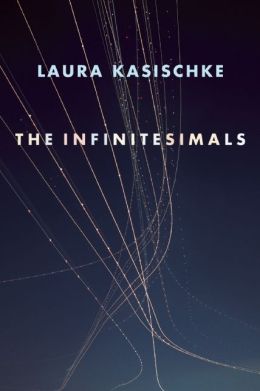 The book is almost cellular in its structure; lines from poems show up later as section titles; a series of poems with the same title (“Beast of the Sea”) threads throughout the collection, as does a host of motley dogs (emblems of fidelity, inklings of mystery, chiasmic familiars for god?). This somatic architecture is fitting for poems that are suffused with the body’s imperilment — by disease, old age, accident, despair (“All // that meat — grossly, morosely — weighted / around a soul,” Kasischke writes in “The Book of Life,” “A simple soul! / Exhausting coat! Skipping along like hope”).
The book is almost cellular in its structure; lines from poems show up later as section titles; a series of poems with the same title (“Beast of the Sea”) threads throughout the collection, as does a host of motley dogs (emblems of fidelity, inklings of mystery, chiasmic familiars for god?). This somatic architecture is fitting for poems that are suffused with the body’s imperilment — by disease, old age, accident, despair (“All // that meat — grossly, morosely — weighted / around a soul,” Kasischke writes in “The Book of Life,” “A simple soul! / Exhausting coat! Skipping along like hope”).
 Yet despite their Biblically dark themes at times, the poems are also full of sharp wit and gallows humor, as when the narrator is sent Sylvia Plath to guide her out of the inferno of her illness and despair in “Canto One” (“Shit, I thought. Oh God. They’ve / not sent Virgil to me, they’ve / sent the poet of no way out. They’ve / sent the poet of how to stay”) or “It’s a fine day / except for the doll / someone hung from the overpass” in “Comedy.” A housefly drowns in the Old Testament “flood” of a toilet bowl in “Perspective”; a clown suns himself “on his back on a beach towel / as if the world is a game board, nothing more,” in “Over.”
Yet despite their Biblically dark themes at times, the poems are also full of sharp wit and gallows humor, as when the narrator is sent Sylvia Plath to guide her out of the inferno of her illness and despair in “Canto One” (“Shit, I thought. Oh God. They’ve / not sent Virgil to me, they’ve / sent the poet of no way out. They’ve / sent the poet of how to stay”) or “It’s a fine day / except for the doll / someone hung from the overpass” in “Comedy.” A housefly drowns in the Old Testament “flood” of a toilet bowl in “Perspective”; a clown suns himself “on his back on a beach towel / as if the world is a game board, nothing more,” in “Over.”
Unflinching and generous in their ire, humanity, chagrin, and compassion, the poems in The Infinitesimals show us that even if the sink fills with our own radiated hair and we are forced to contemplate a winter in which we might have to leave the world behind with our loved ones in it, there is more than one way to see:
May Morning
The thoughts of the schoolgirl dragging
her backpack across the grass.
The thoughts of the sleep-
walker, and the trashman, and
the flower tender, and the teenage couple at the mall.
Like I have been handed them all.
Like I have heard their music, as
if the saints. The way
the lilacs that day. As if
a glass box of it. Like
a vial of perfume poured all
over the whole of creation —
perfume extracted from the sky.
Like no grammar.
No make-up.
No time behind my blindfold:
When the hospitalized child
stopped me in the hallway
and told me his name,
Sebastian.
His little white gown. His tiny smile. Blind-
fold yanked off after thousands of years.
Who needed eyes?
[Published July 22, 2014. 100 pages, $12.97 paper]
Lisa Russ Spaar directs the creative writing program at the University of Virginia, Charlottesville. Her most recent collection of poems is Vanitas, Rough (Persea Books).
* * * * * * * * * * * * * * * * * * * * * * * * * * * * * * * * * * * * * * * * * * * * * *
David Roderick
Darktown Follies by Amaud Jamaul Johnson (Tupelo Press)
“What instrument, / the eye sans the heart,” writes Amaud Jamaul Johnson in a poem titled “Then Butterbeans Begins ‘The Itch’.” The poem features Butterbeans and Susie, a black husband-and-wife comedy team from the first half of the 20th century. “The Itch” refers to the end of their vaudeville act, in which Butterbeans brings down the house by dancing and scratching himself in syncopated rhythms. The scene embodies Johnson’s central theme in Darktown Follies. Butterbeans, shown “twisting / like the lining of his liver done / just caught fire,” plays his own body as if it’s an instrument, but in doing so reinforces stereotypes of the African-American male. In this sense, Butterbeans becomes the audience’s instrument of misplaced desire; they fail to see, behind Butterbeans’s antics, “All that hurt & history / steady pulling like a gandy-dancer / long held prisoner behind the curtain, / & forever working, working its way / to the surface of the skin.”
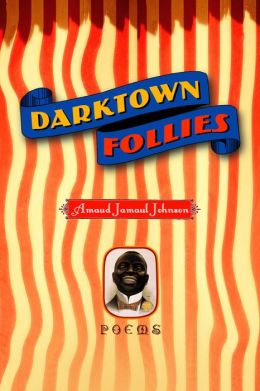 The first half of Johnson’s book travels across a century of American history as represented through developments in African-American theatrical performance: the minstrel, the cakewalk, vaudeville, and the blackface mask, with star-turns by Stepin Fetchit, Thelma “Butterfly” McQueen, Joe Louis, LeRoi Jones, and others. Even porn star Long Dong Silver makes an appearance. Often Johnson approaches his subjects with irony and/or humor, which explains Silver’s presence here, and poems aimed at exhibiting the double-sidedness of performance. So “LeRoi Eating Watermelon at Howard” features LeRoi Jones (Amiri Baraka) doing just that—rejecting an African-American stereotype by defiantly plunging into it, his “teeth damn near gnashing.” Sometimes Johnson’s humor derives from his embodiment of a fresh voice, a voice we’d be lucky to see more of in American poetry. For example, the prose poem “Joe Louis Was a Motherfucker” is delivered in brassy street-talk: “You had to see this nigga in action, jack. Starlight in his hands. Diamond studded starlight, the kind you might find stuck between Elizabeth Taylor’s toes.” These qualities, irony and humor, allow Johnson to explore his subjects from both sides of the performer’s mask.
The first half of Johnson’s book travels across a century of American history as represented through developments in African-American theatrical performance: the minstrel, the cakewalk, vaudeville, and the blackface mask, with star-turns by Stepin Fetchit, Thelma “Butterfly” McQueen, Joe Louis, LeRoi Jones, and others. Even porn star Long Dong Silver makes an appearance. Often Johnson approaches his subjects with irony and/or humor, which explains Silver’s presence here, and poems aimed at exhibiting the double-sidedness of performance. So “LeRoi Eating Watermelon at Howard” features LeRoi Jones (Amiri Baraka) doing just that—rejecting an African-American stereotype by defiantly plunging into it, his “teeth damn near gnashing.” Sometimes Johnson’s humor derives from his embodiment of a fresh voice, a voice we’d be lucky to see more of in American poetry. For example, the prose poem “Joe Louis Was a Motherfucker” is delivered in brassy street-talk: “You had to see this nigga in action, jack. Starlight in his hands. Diamond studded starlight, the kind you might find stuck between Elizabeth Taylor’s toes.” These qualities, irony and humor, allow Johnson to explore his subjects from both sides of the performer’s mask.
We view the subjects in Darktown Follies through Johnson’s acute viewpoint as a citizen, historian, father, and husband. These latter two perspectives become more prominent in the book’s second half, when Johnson slyly demonstrates that his life, too, is uncomfortably shaped by the expectations of an audience. In “Clarence Muse Stars as the Magical Negro in Francis Ford Coppola’s The Black Stallion (1979),” the speaker watches uneasily while his own young son is entranced by the film’s one-dimensional black character. Other poems place Johnson himself in a starring role. Take, for example, the comical opening of “Wine with Hula Hoop”: “I’m a good husband and father / and I think an honest man, / so why do I feel so lascivious?” That poem ends with the speaker swallowing his own honest words. Johnson’s sense of a divided self (superego vs. id) is explored even more gravely in “Center Your Scalpel,” which continues:
herealong the breastbone —
never mindabout the blood
not skinmy cup and bowl not
the darker tributariesof the body
thatlesser sweetnesshard
fought forand rarelywon
held prisonerlike two songbirds
damn nearthe size of a grown man’s
fists. Their coupling
like the soundof a claw-hammer
against an iron door.
Reprinted here in its entirety, “Center Your Scalpel” beckons the audience to peer beneath the speaker’s skin in order to see the real heat and machinery forging his songs.
Johnson effectively juggles dramatic monologues, personae, and points of view to give his readership a nuanced way to think about the problematized dramatic performances under scrutiny, public or private. So Johnson can move from the objective view in “Butterbean,” (“What instrument, / the eye sans the heart”) and then later flesh out from within the humanizing elements of other minstrel performers, as in these final lines of “Bootlick (or a Love Song in Defense of Lincoln Perry a.k.a. Stepin Fetchit a.k.a. Gummy in Hearts in Dixie) (Fox 1929)”:
…Selznick says, cower
and I call this arm, here, my bow-string
and I bend, and I make this body,
frame and membrane, this whirling
dervish of dung and bone, I make myself
a makeshift mandolin, I imagine a pauper’s
harpsichord, and I let them play.
 In addition to Johnson’s expert use of multiple perspectives, he demonstrates in this book, as he did in his debut (Red Summer) that he has mastered the focused, impactful image. Furthermore, his taut and textured lines, whose fussiness and deliberation embody his themes, demonstrate he has harnessed American vernacular. The most important observance of instrumentation in Darktown Follies comes from Johnson’s talent with syntax, as well as his impressively broad range of registers, from the academic to the meditative to the oratory to the slang and syncopations of hip hop. Johnson’s Darktown Follies is one of a very few books I have encountered that satisfies my double desire for lyricism and social consciousness.
In addition to Johnson’s expert use of multiple perspectives, he demonstrates in this book, as he did in his debut (Red Summer) that he has mastered the focused, impactful image. Furthermore, his taut and textured lines, whose fussiness and deliberation embody his themes, demonstrate he has harnessed American vernacular. The most important observance of instrumentation in Darktown Follies comes from Johnson’s talent with syntax, as well as his impressively broad range of registers, from the academic to the meditative to the oratory to the slang and syncopations of hip hop. Johnson’s Darktown Follies is one of a very few books I have encountered that satisfies my double desire for lyricism and social consciousness.
[Published November 1, 2013. 61 pages, $16.95 paperback]
David Roderick is the author of Blue Colonial and The Americans.
* * * * * * * * * * * * * * * * * * * * * * * * * * * * * * * * * * * * * * * * * * * * * *
Lee Upton
Faithful and Virtuous Night by Louise Glück (Farrar, Straus & Giroux)
Louise Glück’s poetry, so often highly awarded and widely recognized, hardly seems as if it needs to be recommended. But maybe it’s time to recognize how peculiar Glück’s work is. In ways that are seldom noted, she is an experimental poet. In her new collection, Faithful and Virtuous Night, she experiments with how far a poem’s images and dramatic momentum eventually can appear to fade on the page and how that enactment of evanescence may temper our reflections about the poems’ subject matter. The poems come loaded with themes of mortality and aging but dissipate the images and scenes in which those preoccupations are rendered.
 In a further experiment, Glück manipulates dramatic shapes by contouring the poems through forms of fiction: the parable, the fable, the romance, the mystery story, the Jamesian sentence, the invented memoir, the afterword. Her longer meditative poems are interspersed by evocative prose poems that are essentially compressed narratives.
In a further experiment, Glück manipulates dramatic shapes by contouring the poems through forms of fiction: the parable, the fable, the romance, the mystery story, the Jamesian sentence, the invented memoir, the afterword. Her longer meditative poems are interspersed by evocative prose poems that are essentially compressed narratives.
Given that the collection focuses on fiction’s conventions, including dramatic tension, scenes in these poems often involve couples: patient and therapist, adult and child, husband and wife, horse and rider, quarreling friends. These encounters tend to achieve a form of suspension rather than a triumph for either partner.
Glück is a great indoors-woman. If a poem is set outside of a house it’s often in cultivated space, such as a garden or a park, and the pace of movement in that place is slow, refined, gently disarming. Her poems, with their sometimes nearly genteel diction, so frequently take place in near-Victorian enclosures that it’s surprising when more contemporary hallmarks appear: airport terminals, films, flight attendants, although references to airports make sense in another way, for Glück always has been a poet given to portraying ascensions.
While her debt to fictional forms is evident, she meshes those forms with echoes from other poets, including T. S. Eliot, one of her first influences. We can even hear her affinities with H.D. who, like Glück, attempts to summon exalted mysteries, although Glück will both summon and dismiss the ecstatic in her melancholy and muted lines, as if dispelling self-delusion.
I first opened the collection, at random, to what turned out to be one of its most compelling poems, “A Work of Fiction.” In the prose poem a speaker, after reading a novel and lamenting that her time with the characters has ended, goes outside to smoke:
In the dark, the cigarette glowed, like a fire lit by a survivor. But
who would see this light, this small dot among the infinite stars?
I stood awhile in the dark, the cigarette glowing and growing small,
each breath patiently destroying me. How small it was, how brief.
Brief, brief, but inside me now, which the stars could never be.
In some ways, this is an uncharacteristic poem for its tenderly perverse little victory. Yet it follows the path where most of these poems lead: toward a realization of interiority; not only smoke is interiorized, but so too are the characters of the novel the woman has read, the characters she has mourned.
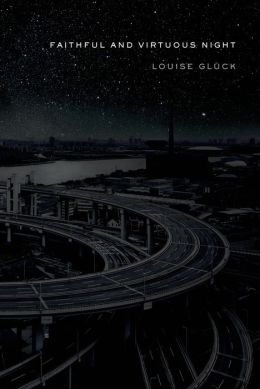 Although “luminous” is the word attached to these poems by the publisher, the description is misleading. While Glück doesn’t deal with psychic extremes, she does deal with the psyche, that territory that has never yet been fully explored and, with any luck, won’t ever be. As its title suggests, her book offers enthrallment to a darkness that should not be illuminated. I suspect that’s why the poems seem to fade on the page, fraying or shedding their own first conceptions into mist. It’s not that all fades out necessarily—all goes into an interior.
Although “luminous” is the word attached to these poems by the publisher, the description is misleading. While Glück doesn’t deal with psychic extremes, she does deal with the psyche, that territory that has never yet been fully explored and, with any luck, won’t ever be. As its title suggests, her book offers enthrallment to a darkness that should not be illuminated. I suspect that’s why the poems seem to fade on the page, fraying or shedding their own first conceptions into mist. It’s not that all fades out necessarily—all goes into an interior.
Glück can madden some readers as the bearer of bad news with her relentless focus on mortality and aging, but her achievement is not facile. In a period when privacy is routinely violated, when all of us can be subjected to an atmosphere of ridicule where no one’s dignity counts, Glück continues to keep faith with what might be called an inner life, a life not subject to search.
[Published September 9, 2014. 71 pages. $23.00 hardcover]
Lee Upton is the author of The Tao of Humiliation: Short Stories (2014). Her sixth collection of poems, Bottle the Bottles the Bottles the Bottles, is forthcoming in spring 2015.
* * * * * * * * * * * * * * * * * * * * * * * * * * * * * * * * * * * * * * * * * * * * * *
Fred Marchant
3 Sections by Vijay Seshadri (Graywolf Press)
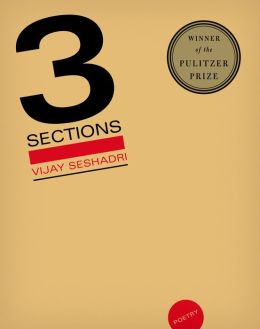 The three sections of Vijay Seshadri’s Pulitzer Prize winning 3 Sections remind me of panels in a Mark Rothko painting. Each section is engrossing in itself, and yet the sum of the book is clearly more than its parts. One also feels that in a Rothko painting one is entering a visionary domain, the dynamics of which extend to infinity. So too with 3 Sections. This is Vijay Seshadri’s book of visions. The central feature of any poetic vision is the sense that there exists a reality beyond the physical world we live and die in. Throughout these poems we find an enduring sliver of hope that human consciousness is greater than mere chemistry, that it holds within it whatever we mean by the soul. It’s also true that this poet’s skeptical intelligence keeps him and us from casually asserting statements about the soul that might ultimately be only delusions. This is poetry thoroughly embedded in our post-everything 21st century. What we see enacted here is nothing less than a search for an authentic, contemporary spirituality.
The three sections of Vijay Seshadri’s Pulitzer Prize winning 3 Sections remind me of panels in a Mark Rothko painting. Each section is engrossing in itself, and yet the sum of the book is clearly more than its parts. One also feels that in a Rothko painting one is entering a visionary domain, the dynamics of which extend to infinity. So too with 3 Sections. This is Vijay Seshadri’s book of visions. The central feature of any poetic vision is the sense that there exists a reality beyond the physical world we live and die in. Throughout these poems we find an enduring sliver of hope that human consciousness is greater than mere chemistry, that it holds within it whatever we mean by the soul. It’s also true that this poet’s skeptical intelligence keeps him and us from casually asserting statements about the soul that might ultimately be only delusions. This is poetry thoroughly embedded in our post-everything 21st century. What we see enacted here is nothing less than a search for an authentic, contemporary spirituality.
The first section of the book consists of thirty-one short poems, each of which makes a foray into a surprising realm of vision. “The Dream I Didn’t Have” begins, for example, with a speaker on an autopsy table, his thoracic cavity about to be opened. We don’t know exactly what has happened, but the speaker is surely dead and yet talking about what he sees around him. He reports that a cop nearby is murmuring to himself: “That must have been a dream, or was it a vision?” And we the readers are asking a similar question. Is this poem just a surreal joke? But before we can answer, the mind of the dead man looks out the window and notes that outside “it was Chicago” with its museums, architecture, elevated trains, all of it “rising from the plains / by the impossibly flat lake.” This seems a satisfying ending to the poem, since it suggests that the soul, hovering over what was its body, has suddenly seen the world anew and with tenderness.
Such revelatory vertigo as we find in “The Dream I Didn’t Have” is typical of 3 Sections as a whole. One meets it throughout the first section, and one experiences also in the second section of the book. In an autobiographical prose piece titled “Pacific Fishes of Canada,” Seshadri recalls a time in the 1970s when he worked as an American government inspector on a Japanese fishing boat out on the Bering Sea. He had gone to sea filled with visions of the sublime, but what he got was relentlessly seasick. The deflation allows him, however, to glimpse something he hadn’t quite expected. Toward the end of his time at sea, Seshadri looked out to the horizon and saw a small boat struggling against another storm rising. “For some reason,” he writes, “nothing has ever given me a deeper education in despair than seeing that longliner working in that emptiness.”
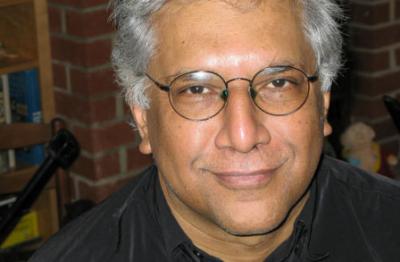 In these poems one often feels Seshadri is working against rising waves of emptiness and despair. What he is enacting in all of them, however, is a process of winnowing away of false visions, the “simulacra” as Seshadri calls them in “Family Happiness.” In the last and climactic section of the book we are immersed in a lengthy meditative poem titled “Personal Essay.” The speaker is in a cab heading to the airport, and as he scans people and places along the streets of Brooklyn, he says to himself: “God of visions, speak to me and say why I should worship thee.” Even if this is an allusion to an otherwise un-named source, the prayer expresses the fundamental emotional engine of these poems. He wants that god to speak to him, and sometimes it does. As this poem ends, Seshadri recalls once being on the edge of sleep and seeing a face, perhaps of someone he knows, arise in his mind. Soon that face turns into many faces known and unknown:
In these poems one often feels Seshadri is working against rising waves of emptiness and despair. What he is enacting in all of them, however, is a process of winnowing away of false visions, the “simulacra” as Seshadri calls them in “Family Happiness.” In the last and climactic section of the book we are immersed in a lengthy meditative poem titled “Personal Essay.” The speaker is in a cab heading to the airport, and as he scans people and places along the streets of Brooklyn, he says to himself: “God of visions, speak to me and say why I should worship thee.” Even if this is an allusion to an otherwise un-named source, the prayer expresses the fundamental emotional engine of these poems. He wants that god to speak to him, and sometimes it does. As this poem ends, Seshadri recalls once being on the edge of sleep and seeing a face, perhaps of someone he knows, arise in his mind. Soon that face turns into many faces known and unknown:
They’re wrapped and wrapped tight around themselves
as the quarter-mile of yarn that makes a baseball
is wrapped and wrapped around its cork-and-rubber core,
as the plasmic sun is wrapped around
its even more plasmic core, exploding in thermonuclear joy.
That is how it is looking at these faces.
That baseball yarn and nuclear fusion remind us that this is not the visionary world of Blake or Ezekiel. Nonetheless, skeptical and tentative as they are, these poems offer visions that feel credible, trustworthy, and that just might be enough.
[Published September 3, 2013. 75 pages, $22.00, hardcover]
Fred Marchant is the author of four books of poetry, and a new collection, The Day Later, is forthcoming from Graywolf in 2016. He is the Founding Director of The Poetry Center at Suffolk University in Boston.
* * * * * * * * * * * * * * * * * * * * * * * * * * * * * * * * * * * * * * * * * * * * * *
Katie Ford
The Accounts by Katie Peterson (Universioty of Chicago Press)
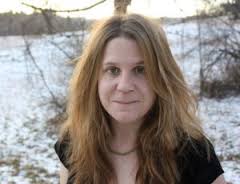 One of poetry’s “terrible responsibilities,” to invoke a phrase by Oscar Milosz, is not simply to honor or resurrect the dead through artistic representation of them, but to create a family of this world of grievers. Once in a while, a grieving poet bears out that horrifying responsibility and sings into us the intricacies of such pain and loss.
One of poetry’s “terrible responsibilities,” to invoke a phrase by Oscar Milosz, is not simply to honor or resurrect the dead through artistic representation of them, but to create a family of this world of grievers. Once in a while, a grieving poet bears out that horrifying responsibility and sings into us the intricacies of such pain and loss.
Katie Peterson, to whom we owe an enormous debt for elegizing her mother in The Accounts, is such a poet. In a time when it seems the elegy for a parent is disregarded as a form of exaggeration—was the mother dead by 40? And if not, why such grief?
Eulogy
Morning, brilliant light, the arms of the lawn chair
and the exhaustion of the eyes, the edges
of the yard pintucked into place,
the root of the orange
tree, and the earth filled with sweet alyssum
hinges on it, like a human hip bending to pick a coin up.
My father is writing my mother’s eulogy.
She isn’t dead. Last night was the last
night of language, words had
already stopped, days before, but last night,
it appeared she discovered a new
language, in blinks she asked
for coffee, then, for the first song
from the Bill Evans trio’s Waltz for Deby.
Or we asked her and she said yes,
and yes looked like
both eyes shut at once. Under the sun
umbrella, beneath the nest,
my father has just finished writing
his account of her life, eloquent but very simple,
factual and correct, it does not pander
with jokes, as its writer is already liked. Habitual,
it shies from anecdote. A perfect wife,
she contains sweetness
but not as in sugar in cube form, not formal, but sweet
as in honey dissolved in lemon
juice for a sick friend
with a sore throat. I am also in his speech.
I say something that resolves death.
The yard fills with sentences
now, the yard accepts another hour of closer
sunlight. In the speech, I say
all time is extra. I say we are lucky
under palm trees. The imagery
that dominates my father’s complex
diction is that of light. His draft
full of tiny crossings out. The mother robin
polices the nest with her absence—
she hides it, she knows gratitude
for safety can’t save her,
it would be gratitude to a predator
for not eating her, and that’s only as good as silence.
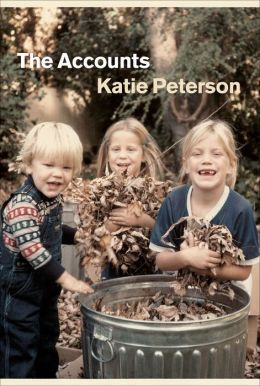 Peterson restores us to our deeper intuition: pain is pain, and it sings in us. It takes a mind (and a soul, if I can dare say the word) as ruminative and brilliant as Peterson’s to remember us back toward this truth: the complexity of pain can, if we utter it, bind one human to another. If you grieve — and you do or someday shall — read The Accounts.
Peterson restores us to our deeper intuition: pain is pain, and it sings in us. It takes a mind (and a soul, if I can dare say the word) as ruminative and brilliant as Peterson’s to remember us back toward this truth: the complexity of pain can, if we utter it, bind one human to another. If you grieve — and you do or someday shall — read The Accounts.
[Published September 19, 2014. 104 pages, $18.00 paperback]
Katie Ford’s new collection Blood Lyrics has just been published by Graywolf Press.
* * * * * * * * * * * * * * * * * * * * * * * * * * * * * * * * * * * * * * * * * * * * * *
Nick Sturm
Soft Threat by Alexis Pope (Coconut Books)
Over the last few weeks Taylor Swift posts lyrics from her new album 1989 on Instagram, performatively genuine hand-written missives bubbling with the shaded bleed of a delirious Polaroid nostalgia. I double tap each of them, thinking through what NPR means by Taylor’s “new voices,” watching that disembodied heart appear and fade over the nested frames of sparkling rosy-cheeked privilege that Taylor fetches with full hands, the Scottish Fold of her disposition, out of legally tender green stuff woven. It’s the soundtrack of a feminine subjectivity whose vocabulary is a sugary cereal aisle of anonymous jouissance. It’s rich, and we all feel it. The eighth track on the album, the dug up hatchet anthem “Bad Blood,” pumping with the chorus “Cause baby now we got bad blood / You know we used to be mad love,” is an unknowing repetition of Rimbaud’s “Bad Blood,” one of the performatively tortured banners of his A Season in Hell that reads “Life is the farce we all have to lead,” and of Breton’s Mad Love, a theory-narrative following his Surrealism’s convulsive beauty into “the uproar and sparkle that excuse everything,” as he says, excusing his own power in the process. Taylor’s inadvertent male avant-garde echoes (perfectly sold-out in the recent Cageian glitch-release of nine seconds of white noise as one of her new singles) aren’t particularly meaningful, but it’s worth trailing these sudden incongruities of pop and lit that thread the lives of certain readers, engraving our fascinations and obsessions between page and unpaginated being. That site, where art and our roles in capital compete and collide, with so many likes, is where I’m asking questions.
 There is a kind of value in this way of beginning to read Alexis Pope’s first book, Soft Threat, where the bursting presence of a radical feminine subjectivity, drifting apart and next to the famous landmark of 1989, is desiring and making choices about the contradictions it embodies, resists, collapses in a way that is not accidental, facile, glittered over. Soft Threat immediately calls on lyrics from Hole’s 1994 Live Through This (it’s own soft threat) to jewel each section and an epigraph from Anne Sexton, a poet whose feminine subjectivity was adamantly rejected by some of the irreducible women who followed her, poets like Alice Notley saying “I decided the poems of Plath and Sexton were a genuinely negative force,” the same Notley whose poems of mothering and othering in the tradition, in the home, labor as predecessors of Pope’s book. Listening to both Courtney and Katy, reading both Anne and Alice, these poems pronounce a fearless, vivid presence: “I fuck / a lot of things” (“Teenage Dream”) and “I burnt it as they say / to the ground” (“Famous Landmarks I Demolished”). This isn’t a book of broken hearts and weak shade. It’s a luxurious muck of shuddering lyrics and visceral attention to pain’s desires, a particular female body’s way of appropriating the mise en scène of male-staged want and suffering. “give me / a love poem / i can fuck to,” Pope writes in “Some Man,” “i want / a good man / with diamonds / for his dick.”
There is a kind of value in this way of beginning to read Alexis Pope’s first book, Soft Threat, where the bursting presence of a radical feminine subjectivity, drifting apart and next to the famous landmark of 1989, is desiring and making choices about the contradictions it embodies, resists, collapses in a way that is not accidental, facile, glittered over. Soft Threat immediately calls on lyrics from Hole’s 1994 Live Through This (it’s own soft threat) to jewel each section and an epigraph from Anne Sexton, a poet whose feminine subjectivity was adamantly rejected by some of the irreducible women who followed her, poets like Alice Notley saying “I decided the poems of Plath and Sexton were a genuinely negative force,” the same Notley whose poems of mothering and othering in the tradition, in the home, labor as predecessors of Pope’s book. Listening to both Courtney and Katy, reading both Anne and Alice, these poems pronounce a fearless, vivid presence: “I fuck / a lot of things” (“Teenage Dream”) and “I burnt it as they say / to the ground” (“Famous Landmarks I Demolished”). This isn’t a book of broken hearts and weak shade. It’s a luxurious muck of shuddering lyrics and visceral attention to pain’s desires, a particular female body’s way of appropriating the mise en scène of male-staged want and suffering. “give me / a love poem / i can fuck to,” Pope writes in “Some Man,” “i want / a good man / with diamonds / for his dick.”
 These poems perform their own vulnerability (the soft) and their own irreducibility (the threat) by tangling how love and its felt layers mesh the intersection of responsibility and lust, how we devote our bodies to one another and, in doing so, ask our bodies to share borders – a dangerous, necessary event, both in the world and in the poem. The personality that animates Soft Threat is desperate and relentless, prepared to tear apart the manmade, the “man moan,” with all its connotations, but in the same gesture to be a vulnerable space for beginning to speak in what denies us: “It only takes / lying down to make us holy” (“The Eve of a No Good Something”). This holiness though isn’t a resolution towards a higher order but a rigorous shine, a continual birth beyond the ornament of miracle and mired in the work of seizing one’s blood, one’s place. “i curate / i hammer / i milk,” Pope writes in “Famous Landmarks I Built,” aligning making and unmaking beyond a simple dichotomy of creation/destruction towards a more brutal liveliness, a wilder pleasure. The formal variance in Soft Threat carries this complexity through into the time of reading, the poems’ spokenness altering the shape of its crisis again and again, whether in pressured couplets or the jagged shapeliness of fields, to make a book that pauses at its own totality, resisting transcendence into clean literature in favor of the difficulty of its own making. As Notley says, “Poetry’s essence and flaw is voice.” As Love says, “I might lie a lot but never in my lyrics.” Soft Threat sheds into these breaks, is bloody, devoted, there.
These poems perform their own vulnerability (the soft) and their own irreducibility (the threat) by tangling how love and its felt layers mesh the intersection of responsibility and lust, how we devote our bodies to one another and, in doing so, ask our bodies to share borders – a dangerous, necessary event, both in the world and in the poem. The personality that animates Soft Threat is desperate and relentless, prepared to tear apart the manmade, the “man moan,” with all its connotations, but in the same gesture to be a vulnerable space for beginning to speak in what denies us: “It only takes / lying down to make us holy” (“The Eve of a No Good Something”). This holiness though isn’t a resolution towards a higher order but a rigorous shine, a continual birth beyond the ornament of miracle and mired in the work of seizing one’s blood, one’s place. “i curate / i hammer / i milk,” Pope writes in “Famous Landmarks I Built,” aligning making and unmaking beyond a simple dichotomy of creation/destruction towards a more brutal liveliness, a wilder pleasure. The formal variance in Soft Threat carries this complexity through into the time of reading, the poems’ spokenness altering the shape of its crisis again and again, whether in pressured couplets or the jagged shapeliness of fields, to make a book that pauses at its own totality, resisting transcendence into clean literature in favor of the difficulty of its own making. As Notley says, “Poetry’s essence and flaw is voice.” As Love says, “I might lie a lot but never in my lyrics.” Soft Threat sheds into these breaks, is bloody, devoted, there.
Published November 15, 2014. 108 pages, $15.00 paperback]
Nick Sturm is the author of How We Light, published by H_NGM_N in 2013. His chapbooks include Labor Day (Forklift, OH) with Carrie Lorig, and I Was Not Even Born (Coconut) with Wendy Xu.
* * * * * * * * * * * * * * * * * * * * * * * * * * * * * * * * * * * * * * * * * * * * * *
Leslie Shinn
Darkness Styicks to Everything: Collected and New Poems by Tom Hennen (Copper Canyon Press)
Open and close, trimmed and brimming, the aphoristic but expansive poems of Tom Hennen address ordinary subjects. His notice falls on a day, the night, a tree in view, and stuff like how the light looked. These poems remark on small things, on slivers of sight and other perceptions, and his attention is rapt and watchful. Hennen is gifted at illuminating the homely as it transforms in his vision to the archetypal, or expresses a marvelous truth, as here in the often quoted, sweepingly titled and entire “Summer Night Air”:
Night doesn’t fall
It rises
Out of low spots
Tree trunks
And the back
Of the old cow
I’m bringing home to milk.
 Though this agreeably bulky little book is Hennen’s first nationally distributed title, meaningful pieces of all his previous publications are here. These include the Selected Poems 1963-1983, and start with his first chapbook, The Heron with No Business Sense, which appeared from the Robert Bly-sponsored Minnesota Writers’ Publishing Group in 1974. As a printer in one of his incarnations, Hennen set the type for this famous chapbook series in his Morris, Minnesota garage.
Though this agreeably bulky little book is Hennen’s first nationally distributed title, meaningful pieces of all his previous publications are here. These include the Selected Poems 1963-1983, and start with his first chapbook, The Heron with No Business Sense, which appeared from the Robert Bly-sponsored Minnesota Writers’ Publishing Group in 1974. As a printer in one of his incarnations, Hennen set the type for this famous chapbook series in his Morris, Minnesota garage.
A reader will turn only a few pages before noting Hennen’s alignment with such other outdoorsmen-poets and masters of complex brevity as Kooser, Tranströmer, Hauge. His poems’ settings and situations emanate chiefly from the observer/self, a mild but exacting recorder whose sole voice edges and sharpens the visual caught in his narrow swath. Hennen draws what he senses into small sketches of the transcendent within the substantial, the impactful images the stage-sets of deeper discernments. The prose poems in this volume from his 1997 Crawling Out the Window are spare and other-dimensional, as here in “Two Crows and a January Thaw”:
In deepest winter two crows throw their voices into the blue air. Toward the end of the thawing day they rise on the still-mild wind, two notes of music that have escaped the songbook. They drift out of sight and back again. Their rough calls float down light as shadows growing long. Soon in the dark pine grove the crows and the night will be silent, empty, waiting to fill with stars.
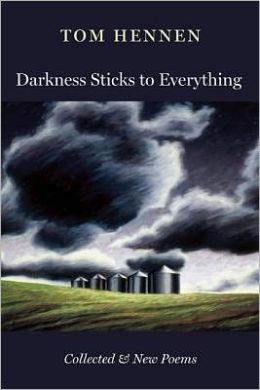 Hennen’s poems often begin in the work he performed as a long-time employee of Minnesota’s Department of Natural Resources: planting little pine trees, digging in a gravel pit, killing thistles in a field using a backpack sprayer and “the chemical 2, 4-D.” He depicts the many plants and grasses, charmingly differentiates between toads and frogs, and knows about wolves. There is seasonal light of many fresh and beautiful descriptions, and all kinds of skies and winds. He achieves a restrained richness through his particular but non-repetitive manner of abiding attention and bare, elegant portraiture.
Hennen’s poems often begin in the work he performed as a long-time employee of Minnesota’s Department of Natural Resources: planting little pine trees, digging in a gravel pit, killing thistles in a field using a backpack sprayer and “the chemical 2, 4-D.” He depicts the many plants and grasses, charmingly differentiates between toads and frogs, and knows about wolves. There is seasonal light of many fresh and beautiful descriptions, and all kinds of skies and winds. He achieves a restrained richness through his particular but non-repetitive manner of abiding attention and bare, elegant portraiture.
I read these poems for the surprises and jewels. I prize them for their sculpted forcefulness and ingeniously deep economies. “Light leaves the earth a piece at a time, one hand letting go of the tree branch while the other hangs on longer, slowly losing its grip until it understands no help is coming and at last lets go.” As a native Iowan I relate to Hennen’s landscape, and admire and feel enriched by his immersion. He brings the hard, hard-grass prairie fields close, and the crickets and the grasshoppers, and reminds me about the very particular nature of the coldest-day snow his father called “skift:” “bread flour,” spreading “in thin ribbons on the clear ice of puddles frozen to the dirt.”
And I read them for the simply cast insights, his quiet talk about hard weather and the other disintegrators, which occur from the beginning —
Home Place
The old house went down the basement stairs
And didn’t come back up.
The people
The cows
The sheep
The pigs and the chickens
Have disappeared through a great hole
In the landscape.
— to the end, as in “Corn Picking 1956 — Afternoon Break,” a heartbreaking, layered evocation of a cold prairie day spent in his father’s company.
Hennen illustrates things and “the otherness of things,“ “the differences of objects.” He says, “each tree, each clod is filled with the mud of its own stars.” His work is “following the seasons around,” arriving at “a cabin / With kitchen lights already on.” Working alone, cleaning the day’s catch at night, he observes, “Darkness sticks to everything.” So it does, in a gleaming, fish-scale-sequin way.
[Published May 7, 2013. 180 pages, $18.00 paperback]
Leslie Shinn’s Inside Spiders was awarded the 2013 Lexi Rudnitsky First Book Prize in Poetry from Persea Books. She lives and works in Philadelphia.
thank you
I look forward to this blog post 2x a year. I always get clued into good stuff.
I picked up _The Feel Trio_ and _A Wilderness of Monkeys_
thanks as always
Jennifer